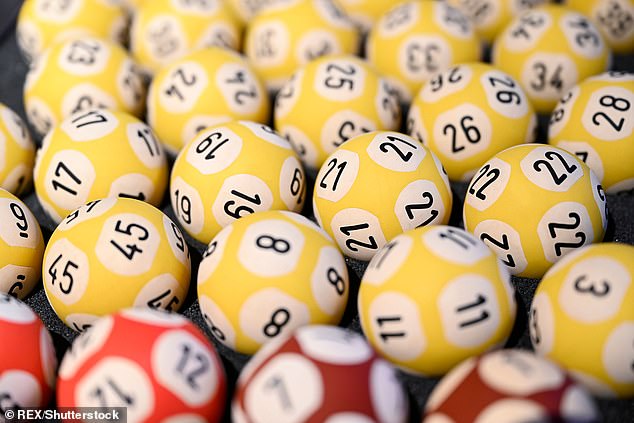The man who thinks he’s discovered the trick to winning the lottery reveals his secrets – and is so confident they’ll work that he’s got the champagne ready
Retired entertainer Ray Spiller, 71, is so confident he’s going to win the National Lottery that he has a few bottles of champagne ready to celebrate.
He has always enjoyed participating in the draw since it began 30 years ago, but in December Ray decided to see if people would join a lottery syndicate to buy tickets together and increase their chances of winning.
Ray expected a few people to sign up, but now the numbers have grown to over 70, which amounts to eight groups in just a few months.
Ray Spiller and his wife Jan, 69, began arranging coach trips for their Essex community to visit London theatres, seaside resorts and stately homes. This is where Ray’s lottery syndicate members were first found.
His syndicate groups are so popular that he has a waiting list of hopefuls and when they reach nine people, he creates a new one. Ray is the tenth member of each group.
Potential millionaires know the odds are stacked against them – 45 million to one for every ticket that wins the jackpot. That’s where syndicates come in.
The premise is simple: pay an amount every month to participate in the lottery as a group.
A team is given more chances to match the winning numbers. For example, a group of ten who each bet £2 on each draw will have ten tickets in the running to match the winning numbers, instead of just one. The only difference is that syndicate members must split the prize money between themselves if they win.

Retired entertainer Ray Spiller, 70, is so confident he will win the National Lottery that he has been saving up bottles of champagne in case he does win the lottery.
The dynamic was even the subject of a BBC TV drama – The Syndicate – in which supermarket workers join forces to win the lottery. Ray, who lives in Broomfield, Essex, said: ‘The big win is definitely coming soon. I’m telling all the members – it’s going to happen.’
However, so far none of his syndicates have won more than £140 in a series (with four numbers matching).
How did Ray’s lottery hobby begin? As the country emerged from the haze of Covid lockdowns, Ray and his wife Jan, 69, began arranging coach trips to London theatres, seaside towns and stately homes.
What they thought would be a few trips a year has grown into a full-time business and the couple are working harder than ever, despite having retired from their jobs as live entertainers in clubs.
Ray and Jan keep avid coach trippers informed via the Broomfield Coach Trips newsletter. This is sent to 3,600 people each month and last year Ray suggested the idea of forming a raffle syndicate for subscribers. The rest, as they say, is history.
He now buys ten Lotto lines per syndicate group for each draw – Wednesday and Saturday – for four weeks. That works out at £16 per member, but it can be less if the syndicate has had a lucky month, as Ray takes the winnings off the cost of the next round of lines.
If they were playing alone, the odds of members winning the jackpot would be one in 45,057,475 for the £2 stake per game (one ticket). In one syndicate of ten people (ten tickets), everyone has a one in 4,505,748 chance, even though they haven’t increased their spend at all.

The couple is happy with where they live now, so they plan to spend their future winnings on outings for the syndicate members
Ray spends about 14 to 16 hours each month on administration to keep everything running.
He goes online and chooses the Lucky Dip random generator option, rather than choosing the sequences himself. For complete transparency, he then compiles a document with the numbers for each syndicate for the four weeks and sends it to the group before the first draw. Ray and Jan check after each draw if any of the numbers match, even if they arrive home late after a bus trip to the capital.
Jan says, ‘He’s sitting there glued to the computer. I’m thinking, “Here we go again.”‘ The pair each check half of the lines.
“The National Lottery emails me to say I’ve won, so even if I hadn’t checked I would know,” says Ray. “But we check on the day of the draw anyway because of the excitement.”
The syndicates usually match two numbers on dozens of lines (this gives them a free entry into the Lotto Lucky Dip). They have also won £30 66 times.
“We need to add a few more zeros!” Jan adds.
One of the syndicates made a bigger win a few weeks ago when they matched four numbers and collected a prize of £140.
“The sweat started pouring down my neck and I started thinking, ‘This is it!'” Ray says. “I get nervous when the first three numbers match.”
The National Lottery website advises syndicates to draw up an agreement to give all members “peace of mind”. A document also helps ensure winnings are tax-free, it says. It can prove to the tax office that payments to syndicate members are prizes and not gifts.
Ray’s agreement lists his address and bank details and states that players will be paid their money within four weeks. Should they win the jackpot, the group will not publicize it.
‘When the real big win comes in, I’ve already told the syndicates we’ll hire the County Hotel for the afternoon and I’ll hand out the cheques. We’ll do a cream tea for everyone.

One of Ray’s syndicates made a bigger profit two weeks ago when they matched four numbers and collected a nice prize of £140
“Most people want to buy a big house with seven bedrooms and a swimming pool, but we’re quite happy here. They’re stupid things. I’ve always wanted a grandfather clock. And Jan’s turning 70 next year, so I’d buy her something special.”
Donating to charity is also high on the couple’s wish list: ‘We’re on the approach route for the trauma helicopter,’ Jan explains. ‘If we make this big profit, we’ll go there and give them a check.’
And as Ray says, ‘The lottery has the best chance of course, but one day…’
- Are you a member of a lottery syndicate? Email l.evans@dailymail.co.uk
Syndicates: What You Need to Know
1. Syndicates must appoint a manager who will select the numbers, organise the draws and collect and distribute the funds.
2. There is no limit to the number of people you can have in a syndicate, but the profits will become smaller as more people join.
3. Agree on how the syndicate will work before you play. For example, discuss what would happen if the syndicate won the week a member missed a payment. Decide if the group will go public if you win a big prize.
4. Keep track of who is in the syndicate. This is because lottery winnings are tax-free. However, if you are not registered and the syndicate wins, it may appear that the manager is the winner and distributes the winnings as gifts to other members. Gifts may be subject to inheritance tax if the syndicate manager dies within seven years and exceeds the tax-free limits.
5. For additional transparency, managers can tell the group what numbers were entered or share photos or screenshots of the tickets to prove they were purchased.
6. Syndicate managers can update their online National Lottery account to show their status. However, if managers are buying tickets in person, they do not need to register.
Some links in this article may be affiliate links. If you click on them, we may earn a small commission. That helps us fund This Is Money and keep it free. We do not write articles to promote products. We do not allow commercial relationships to influence our editorial independence.
